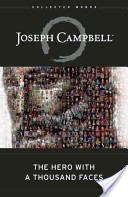…the adventure of the hero normally follows the pattern of the nuclear unit above described; a separation from the world, a penetration to some source of power, and a life-enhancing return. – p 35
This is the most basic outline of the rather circular hero story. Unlike the outline of any old story, the conflict, the uncomfortable realm, is supernatural in some way in the hero story.
Everywhere, no matter what the sphere of interest (whether religious, political, or personal), the really creative acts are represented as those deriving from some sort of dying to the world; and what happens in the interval of the hero’s nonentity, so that he comes back as one reborn, made great and filled with creative power, mankind is also unanimous in declaring. We shall have only to follow, therefore, a multitude of heroic figures through the classic stages of the universal adventure in order to see again what has always been revealed. This will help us to understand not only the meaning o those images for contemporary life, but also the singleness of the human spirit in its aspirations, powers, vicissitudes, and wisdom. – p 35-36 (emphasis added)
Campbell lists the steps of the universal hero story, which are also the chapters in his Part I (We’re still in the prologue for this and another chapter):
1 Departure
1.1 The Call to Adventure
1.2 Refusal of the Call
1.3 Supernatural Aid
1.4 The Crossing of the First Threshold
1.5 Belly of The Whale
2 Initiation
2.1 The Road of Trials
2.2 The Meeting With the Goddess
2.3 Woman as Temptress
2.4 Atonement with the Father
2.5 Apotheosis
2.6 The Ultimate Boon
3 Return
3.1 Refusal of the Return
3.2 The Magic Flight
3.3 Rescue from Without
3.4 The Crossing of the Return Threshold
3.5 Master of Two Worlds
3.6 Freedom to Live
– p 36-37
He draws a distinction between a “hero of the fairy tale” and a “hero of myth” : “Typically, the hero of the fairy tale achieves a domestic, microcosmic triumph, and the hero of myth a world-historical macrocosmic triumph.” – p 37-38
He writes:
The godly powers sought and dangerously won are revealed to have been within the heart of the hero all the time. He is “the king’s son” who has come to know who he is an therewith has entered into the exercise of his proper power-“God’s son,” who has learned to know how much that title means… the two-the hero and this ultimate god, the seeker and the found-are thus understood as the outside and inside of a single,self-mirrored mystery, which is identical with the mystery of the manifest world. The great deed of the supreme hero is to come to the knowledge of this unity in multiplicity and then to make it known.
My thoughts & questions
- The story of the hero demands the supernatural. Campbell as an atheist doesn’t believe in the supernatural, yet he believes we must live out the subconscious hero story for our own well-being. His conclusion is thus that we just need to go through the motions.
- What if, instead, the repetition of this same hero story in every human heart and in every culture is a story written by an author, directing us to the life we’re supposed to be living and/or to the real ultimate hero of all reality? I don’t think the data drives the conclusion, but the worldview of the author.
- Campbell’s desire to go through the motions includes stepping through a stage of rebirth. Isn’t being born something that someone else does to a person? How does one walk through a passive step in denial of the one who births? Or is this just a weakness of language?
- One of my ongoing questions is whether the biblical call to discipleship is a call to all to engage in the hero story themselves. The quote above lends itself well, as he is using biblical language of dying the world and being reborn. Biblical Christianity speaks of this being a spiritual reality as well as the symbolism of baptism. In this case, it seems that delaying baptism is putting the breaks on the story, not really engaging with it; being stuck in what Campbell calls The Refusal of the Call.
- How does this compare with the list compiled by Lord Raglan I posted yesterday?
